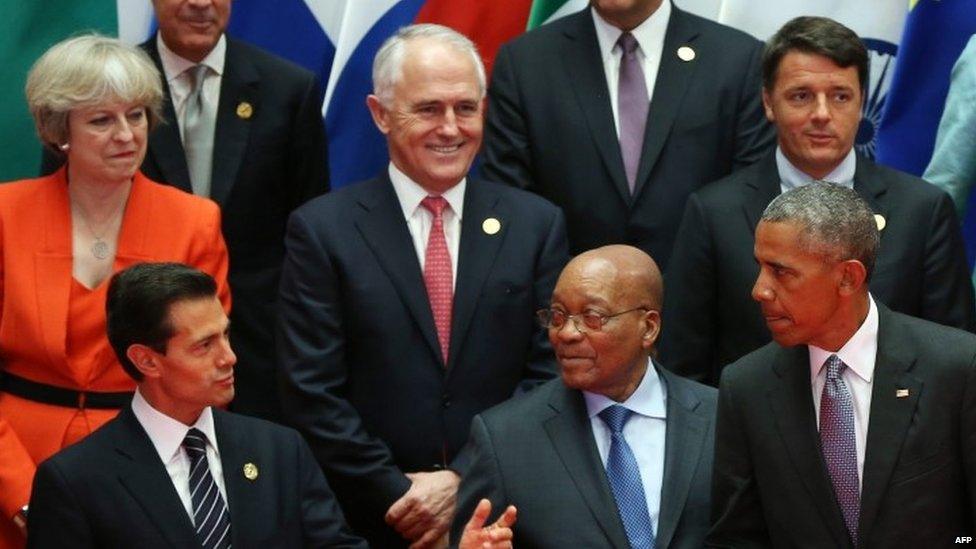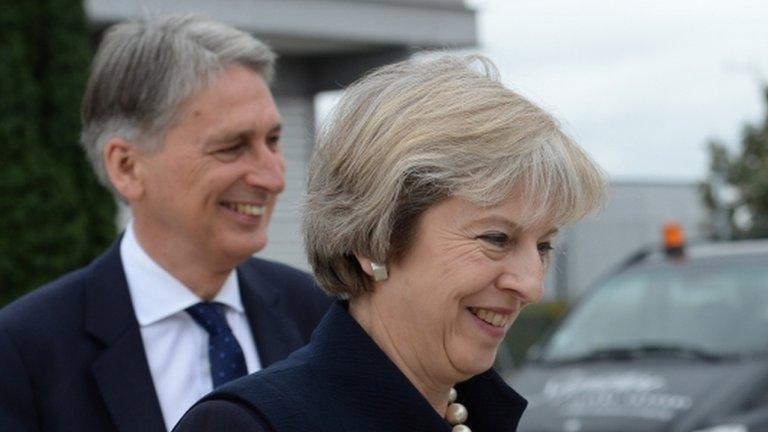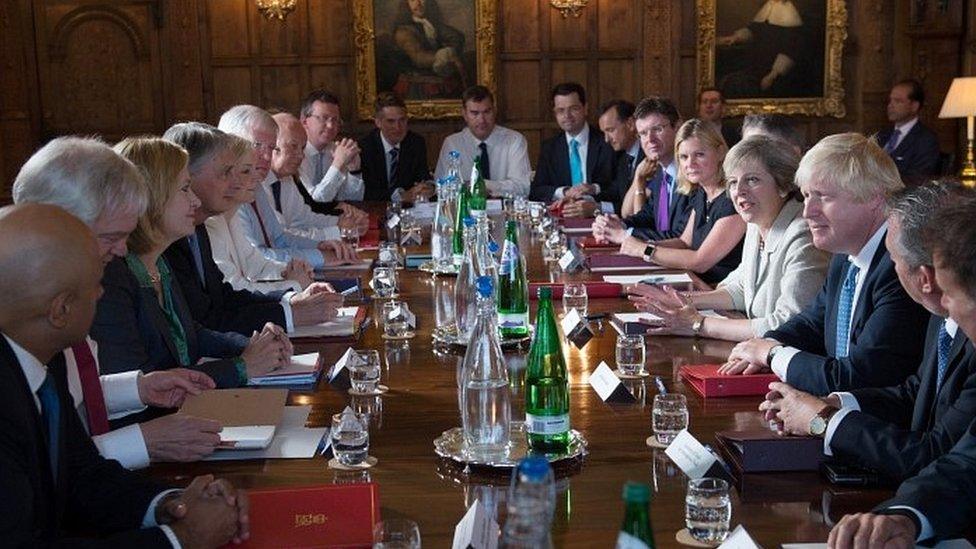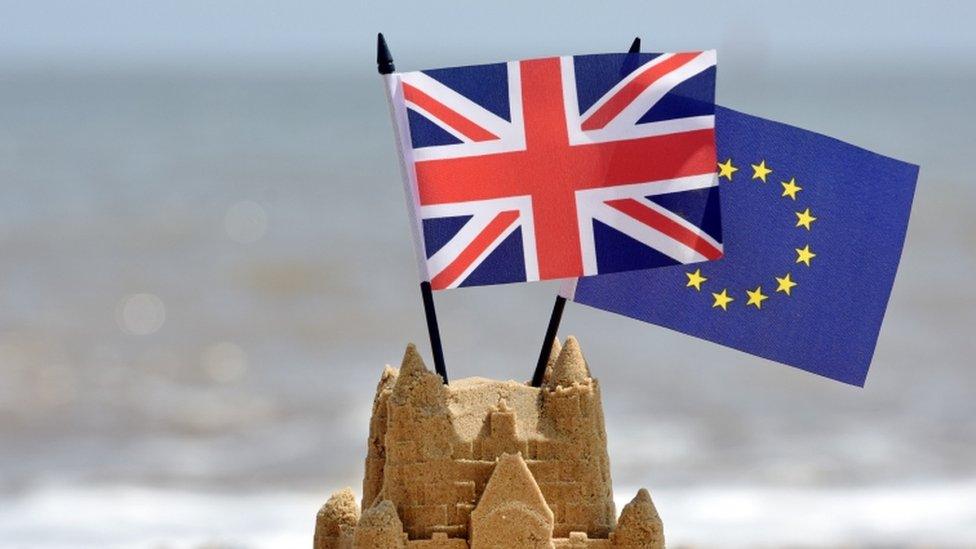Brexit may bring difficult times, says Theresa May
- Published
The prime minister says "it won't be plain sailing" for the economy as the UK seeks to extricate itself from the EU
Britain needs to be prepared for some "difficult times" ahead as it leaves the European Union, Prime Minister Theresa May has said.
Speaking to the Andrew Marr Show - in her first major interview since taking office - Mrs May warned Brexit would not be "plain sailing" for the UK.
She said formal EU talks will not begin until 2017, but vowed the process would not be "kicked into the long grass".
Mrs May also ruled out a snap election, saying the UK needs "stability".
The former home secretary became prime minister after David Cameron resigned in the wake of the EU referendum - with the Brexit process likely to dominate the first years of her premiership.
Speaking before travelling to China for the G20 summit, Mrs May said she would not pretend that leaving the union would be "plain sailing", despite positive economic figures in the UK since the referendum.
"We have had some good figures and better figures than some had predicted would be the case. I'm not going to pretend that it's all going to be plain sailing.
President Obama: "The basic premise is that together we reaffirm the very special relationship between the US and the UK"
"I think we must be prepared for the fact that there may be some difficult times ahead. But what I am is optimistic."
She insisted the country would "make a success" of leaving the EU, saying she was also "optimistic" about new opportunities for Britain outside the EU.
The prime minister said she wanted "an independent Britain, forging our own way in the world".
'Consult closely'
Ahead of the summit, she met for talks with US President Barack Obama.
Speaking to reporters afterwards, President Obama said the US would "consult closely" with the UK over Brexit negotiations to ensure there were no "adverse effects" in the US-UK trading relationship.

The prime minister is making her debut on the international stage at the G20 summit
He said: "We're going to do everything we can to make sure that the consequences of the decision don't end up unravelling what is already a very strong and robust economic relationship that can become even stronger in the future."
But President Obama said before that it would be important to work out "what Brexit means for Europe".
He denied suggestions that earlier this year he had threatened to "punish" the UK if it voted to leave the EU when he said the UK would go to the "back of the queue" for trade deals with the US.
He said those comments, made in April, had been in response to suggestions that the effects of Brexit would be "minimal".
In her interview with the BBC, Mrs May said the referendum result had shown voters did not want "free movement to continue in the way that it has done in the past".
Article 50
She said ministers were looking at "options" for new EU migration controls.
"People also want to see the job opportunities, to see the economic opportunities, and so getting a good deal in trading goods and services is also obviously important for us," she added.
The prime minister says she does not want to call a snap election before 2020 because the country needs stability
The prime minister said she was "very clear" that she expected the status of British citizens in other EU countries to be guaranteed and would "guarantee the status of EU citizens living here".
Mrs May said the government would not trigger Article 50 - which will begin the formal two-year process of leaving the EU - before the end of this year.
However, she added: "I'm very clear also that the British people don't want the issue of Article 50 being triggered just being kicked into the long grass because they want to know we're getting on with the job of putting Brexit into place and making a success of it."
She said Brexit minister David Davis will make a statement to the Commons this week on work the government has done over the summer.
Taking advice
Asked about Scottish independence, the prime minister questioned whether voters in Scotland supported the prospect of a second referendum on independence.
"I think if you look at some of the results that are now coming out of polling in Scotland, they suggest that the Scottish people don't want there to be a second referendum," she said.
Mrs May said the Scottish government would be "fully involved" and "fully engaged" in the Brexit discussions but a spokesman for First Minister Nicola Sturgeon said the onus was on Mrs May and her ministers "to show they are serious about engaging positively with a view to safeguarding Scotland's interests".
During the interview, Mrs May also promised a decision on the Hinkley Point nuclear power plant deal this month, saying she was still taking advice on the issue.
"I don't just come in and say, right, this is the position I take. I look at the evidence, I take the advice, I listen to that. That's what I'm still doing."
Mrs May would not be drawn on the issue of grammar schools, saying the government would wait to hear recommendations from Education Secretary Justine Greening.
She told the programme she wanted to give pupils "opportunities in life".
- Published3 September 2016

- Published31 August 2016

- Published1 September 2016
